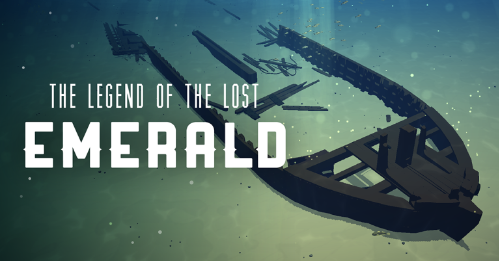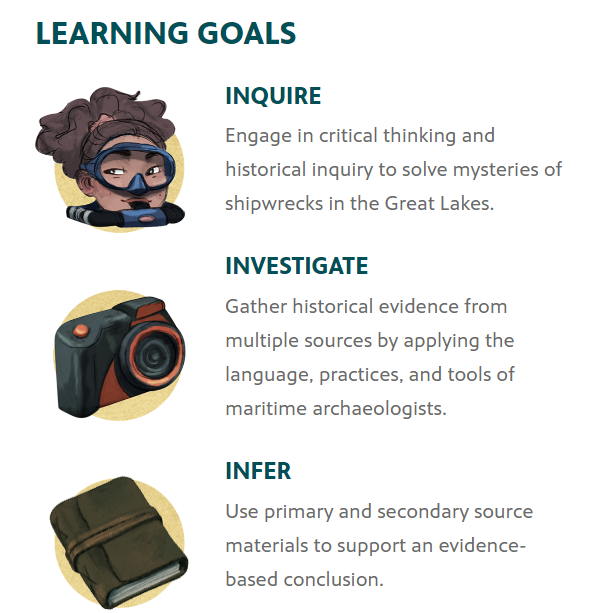Great Lakes Shipwreck Game from UW–Madison Wins Gold in International Competition
Online learning game designed by WCER's Field Day, Wisconsin PBS Education, Wisconsin Sea Grant
June 14, 2022 | By Karen Rivedal, WCER Communications

In the game, young students use critical thinking and historical inquiry skills to recover stories about shipwrecks.
Field Day Lab’s newest online learning game, The Legend of the Lost Emerald, —an immersive, boldly illustrated point-and-click adventure game that teaches while it entertains—won its first accolades this week with a top prize in the 2022 International Serious Play Awards Program in Orlando, Florida.
The free game invites young students to “step into the shoes of Jules,” a maritime archaeologist character working to recover the stories behind shipwrecks inspired by real Great Lakes history. It was one of nine educational games developed for primary or secondary learners to receive a gold medal in the awards program sponsored by Serious Play Conference, a leadership organization of professionals in the field of game-based learning for education or training.
“We were especially impressed with the quality of the games produced for use in K–12 education,” says Sue Bohle, a former high school teacher and Atari Games executive who now leads the conference. “The learning game industry has matured to the place where the new products really work for teachers and parents.”
You can play the game here, and free resources for educators are available here. Field Day Lab is housed in the Wisconsin Center for Education Research (WCER), part of UW–Madison’s School of Education.

The new Field Day game provides learners in grades 4–6 the experience of using the same tools, practices, and skills that maritime archaeologists use to locate and dive for shipwrecks on the Great Lakes. Wisconsin academic standards in English language arts and social studies, and Great Lakes literacy skills are supported through game play and extension activities. It is available in English and Spanish and was designed by Field Day Lab, PBS Wisconsin Education, Wisconsin Sea Grant and an educator advisory group of Wisconsin teachers. The Wisconsin Historical Society’s maritime archeology program also provided key content help.
“I have seen The Legend of the Lost Emerald spark so many fun and meaningful learning experiences for kids,” says PBS Wisconsin Director of Education Alyssa Tsagong. “Creating this game with and for educators from start to finish made it what it is today: a high-quality, engaging, and beautiful learning adventure!”
“The entire collaborative team on this project did an incredible job connecting students to the rich maritime history of the Great Lakes watershed,” says Anne Moser, education coordinator for Wisconsin Sea Grant. “The goal of education at Wisconsin Sea Grant is to spark a passion for the Great Lakes and I have seen how shipwreck stories do just that. We are excited to share this with the educators and youth we work with throughout Wisconsin.”
To refine the game, students play-tested it in classrooms in 16 Wisconsin schools in Madison, Middleton, Racine, Milwaukee, Arbor Vitae, Auburndale, Fish Creek, Wales, Verona, and Burlington. The game has now been played by about 13,000 Wisconsin children and “many more nationally,” Field Day Director David Gagnon says.
The game was designed so it can be fully played in two class periods of 35–40 minutes. Players in character use a simple version of sonar and GPS coordinates to locate wrecks, dive down to take underwater photos, and search for clues in historical artifacts, like letters and ship manifests, while connecting strings of data on a corkboard-style evidence board to draw conclusions and then share discoveries.

Field Day’s Jim Mathews
The game offers four shipwrecks to explore, ending with the Emerald of the game title, a case which also features some family ties to Jules, the archeologist character. In addition to a storyline incorporating a sibling conflict to better engage younger players, the game boasts watercolor paintings and “wonderful music and sound design,” says Jim Mathews, Field Day’s lead producer for the game.
But Mathews says the real music to his ears is hearing from teachers that playing the game in class sometimes leads to students exploring more on their own about shipwrecks, maritime archeology or related subjects.
“We built the game trying to have kids play it, enjoy it, learn something, but really become curious to learn more,” he says, “so that their curiosity would serve as a launching pad for them to engage in other types of activities around historical inquiry. That’s knocking it out of the park for a game as far as I’m concerned.”
“What we would like to see games do,” Mathews adds, “is that they’re not just something you hop on the computer and do for 30 minutes, when there’s free time, but that they’re actually integrated into the curriculum and they spark curiosity and joy in a way that gets kids to dig in and explore some of those ideas in a new context.”
Educational themes explored in Legends of the Lost Emerald include trade and commerce, movement of people, historical preservation, lake ecology, and technological change. Students also learn about the role of archivists, historians and museum curators over four time periods in maritime history, ranging from wooden schooners in the mid-1800s to steel freighters in the 1960s.
Entries in the Serious Play awards program were judged for their success in meeting learning objectives, engagement, aesthetics, and assessment goals. Entry categories included K–12 education, higher education, healthcare/medical, museum/visitor centers, corporate/vocational, military/government, preK education, and non-profit.


